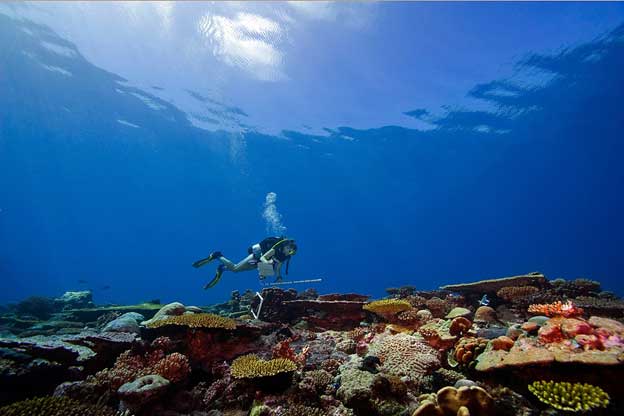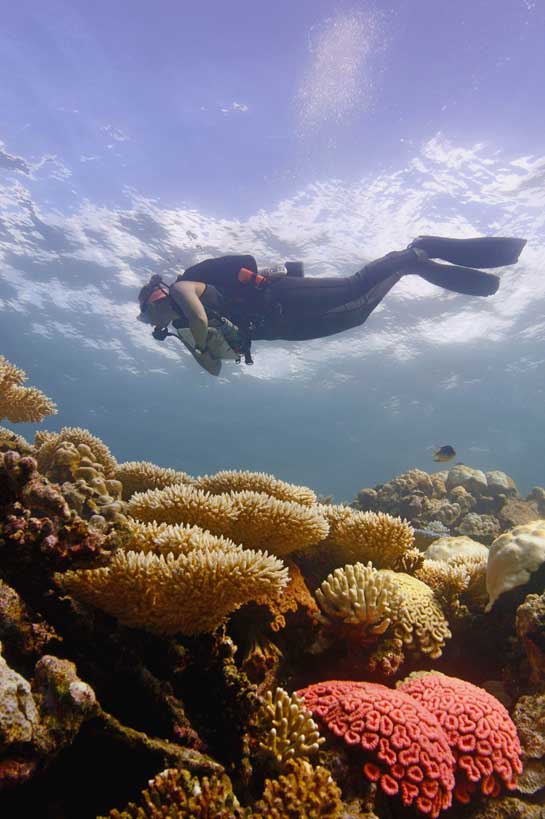The Last Coral Reef Wilderness: the Chagos Archipelago

MARYLAND, USA, Jun 29 (IPS) - On the Global Reef Expedition—the largest coral reef survey and mapping expedition in history—scientists from the Khaled bin Sultan Living Oceans Foundation traveled to the Chagos Archipelago to study some of the most remote coral reefs on Earth.
What we found were reefs teeming with life, but also worrying signs of the unfolding coral reef crisis.
The Khaled bin Sultan Living Oceans Foundation embarked on the Global Reef Expedition to assess the status of coral reefs around the world. Over the course of ten years, the Expedition circumnavigated the globe, visiting over 1,000 reefs in 15 countries in the Atlantic, Pacific, and Indian Oceans and their associated seas, to assess coral reef status and resiliency.
The Expedition surveyed the coral and fish communities on some of the most remote coral reefs on Earth, and there was no better place to do that than in the Chagos Archipelago.
In 2015, the Foundation assembled an international team of scientists to study the coral reefs of the Chagos Archipelago for the final Expedition research mission. Over the course of two months at sea, the scientists conducted thousands of surveys of the benthic and reef fish communities at over 100 locations across the archipelago.
Because of its remote location and protected status, Chagos was the perfect place to study global issues such as climate change and overfishing that threaten the long-term survival of coral reefs.
Reefs are declining due to a variety of human impacts, including coastal development, fishing pressure, and pollution, but these local pressures are absent in Chagos since the archipelago is uninhabited, save for the military base on Diego Garcia.
Prior to the Expedition, estimates indicated Chagos could contain more than half of the healthy reefs remaining in the Indian Ocean.
What we found in the Chagos Archipelago was a stark reminder that the coral reef crisis is affecting reefs everywhere, even in the last great coral reef wilderness area on Earth.

When the research mission began, we found reefs teeming with life, a diverse assemblage of corals, and an abundance of fish. The reefs of the Chagos Archipelago were truly exceptional; they had some of the highest density of coral and fish recorded on the entire Global Reef Expedition.
Reefs were surrounded by schools of jacks and snappers, swarms of small fish clung to the reefs, and large fish such as groupers, sharks, and rays were found throughout the area. Chagos had an astounding abundance and diversity of life in the water and on the seafloor.
However, towards the end of the research mission, we witnessed the beginning of what would become a catastrophic and global coral bleaching event.
In the clear and unusually calm waters of the Indian Ocean, we watched the reefs bleach before their eyes. During the first signs of bleaching, corals turned vibrant, almost neon-colored shades of pink, blue, and yellow before turning white, as the corals tried to protect themselves from the sun’s harmful rays after losing their symbiotic algae.
As the warm waters persisted, the extent of the bleaching was readily apparent and impacted the vast majority of the shallow-water corals.
There was hope that corals in Chagos would bounce back to health relatively quickly. But a study shortly after the bleaching event found live coral fell dramatically from the relatively healthy 31-52% observed on the Expedition, to only 5-15%.
Since then, there have been promising signs the reefs are recovering, but it is unlikely that the reefs will regain their high coral cover for at least a decade after this latest bleaching event.
Because the Expedition was the last research mission to survey the reefs prior to the bleaching, the findings from this research mission will be extremely useful to marine managers as they assess the impact of the bleaching event and monitor how the reefs are recovering over time.
The scientific findings from the research mission were recently published in The Global Reef Expedition: Chagos Archipelago Final Report. This report contains detailed information on the diversity and abundance of corals and reef fish species, along with valuable baseline data on the state of the reefs at a point in time.
This report can help government agencies, conservation organizations, and scientists manage and conserve reefs in the archipelago.
The world has already lost 50% of its coral reefs in the past 30 years. The rest could be gone by the end of the century if nothing is done to save them. With the increased frequency of coral bleaching due to a changing climate, combined with growing human impacts such as overfishing and pollution, coral reefs face an uphill battle to survive.
In the face of the coral reef crisis, the reefs of the Chagos Archipelago face some of the best odds, despite recently bleaching. They are protected, relatively free from human influence, and still contain large and healthy fish populations and a stunning diversity of life.
This diversity may be helping the reefs in Chagos recover from bleaching, but it may also be one of the key factors that could help these reefs survive well into the future.
The Expedition mission to the Chagos Archipelago gave scientists the chance to study some of the most pristine coral reefs in the Indian Ocean. Our findings illustrate what remarkable places coral reefs can be when given the opportunity to thrive, but they also highlight the perils all reefs face in a changing world.
Liz Thompson is Director of Communications for the Khaled bin Sultan Living Oceans Foundation in Annapolis, Maryland, USA. She has more 15 years of experience in marine conservation, policy and communications and writes about the need to protect our marine environment for the use and enjoyment of future generations.
The Khaled bin Sultan Living Oceans Foundation is a nonprofit environmental organization that works to protect and restore the world’s oceans through scientific research, outreach, and education. As part of its commitment to Science Without Borders®, the Foundation provides information to governments, scientists, and local communities so that they can use the latest science to work toward sustainable ocean protection. www.livingoceansfoundation.org
Follow @IPSNewsUNBureau
Follow IPS New UN Bureau on Instagram
© Inter Press Service (2021) — All Rights Reserved. Original source: Inter Press Service
Where next?
Browse related news topics:
Read the latest news stories:
- While India's RAMSAR Sites Tally Rises, Wetlands Remain Endangered Wednesday, April 16, 2025
- Countries finalize historic pandemic agreement after three years of negotiations Wednesday, April 16, 2025
- Food Insecurity an Unprecedented Crisis Worldwide Wednesday, April 16, 2025
- The Long Goodbye: The Rise of Dementia Tuesday, April 15, 2025
- Standing Firm: Civil Society at the Forefront of the Climate Resistance Tuesday, April 15, 2025
- Genocide Prevention & Responsibility to Protect Tuesday, April 15, 2025
- Trump’s ‘Shock and Awe’ Tariffs Tuesday, April 15, 2025
- Is it Time to Say RIP to the SDGs? Tuesday, April 15, 2025
- World News in Brief: Relief supplies for Myanmar, invest in Haiti, child migrant deaths in Italy Tuesday, April 15, 2025
- Israeli strike on hospital ‘further cripples’ Gaza’s fragile health system Tuesday, April 15, 2025